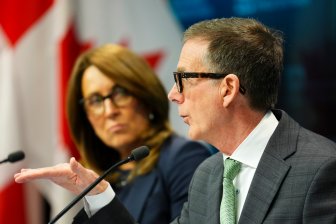High mortgage costs will ‘strain’ budgets. But is the Bank of Canada worried? – National | Globalnews.ca
The Bank of Canada is warning that higher mortgage rates tied to its rapid policy rate hikes over the past year will test some Canadian households’ finances in the months to come.
The central bank’s latest projections about the impact of higher borrowing costs on Canadians come the same day it held its benchmark interest rate at 4.5 per cent.
Read more:
Bank of Canada says it can pause rate hikes as inflation set to ‘decline significantly’
Wednesday’s rate is 4.25 percentage points higher than the rock-bottom lows seen through most of the pandemic, when many Canadians took advantage of cheaper mortgage rates to jump into the housing market.
That’s driven monthly costs higher for homeowners on some variable-rate mortgages and for those renewing fixed-rate terms.
For example, an estimate earlier this year from comparator site Ratehub.ca showed that the average Canadian homeowner who took out a variable rate mortgage to buy a home in January 2022 would be paying roughly $1,500 more per month on the same loan after the last Bank of Canada rate hike.

Taking into account all of the debt on Canadians’ balance sheets, interest payments rose 45 per cent annually to a cumulative $133 billion in the final quarter of 2022, according to a Bank of Canada report released Wednesday.
“The share of income spent on interest payments will continue to rise as homeowners renew their mortgages,” the central bank’s quarterly monetary policy report read.
The Bank of Canada ran a projection for how that mortgage pain might play out on Canadians’ budgets based on the market’s expectations for the central bank rate path at the start of April.
In that scenario, the interest portion on monthly mortgage payments as a proportion of Canadians’ disposable income peaks at 5.5 per cent in the third quarter of the year. That’s the highest level for this figure since the 1990s, the report notes.
“Borrowers may be able to mitigate some of these increased costs; however, their budgets will continue to feel the strain of these costs over the coming quarters,” the Bank’s monetary policy report read.
Read more:
SVB instability could drive some Canadian mortgage rates lower. Here’s why
One thing that’s important to consider, however, is that the market forecast includes calls for interest rate cuts to begin before the end of 2023 — something Bank of Canada governor Tiff Macklem poured water on Wednesday.
“The implied interest rate cuts that are built into the market curve later this year don’t look like the most likely scenario to us,” he told reporters.
Wednesday’s rate hold also came with the caveat that rates could rise even further “if needed” to get inflation back down to the central bank’s two per cent target.
While the Bank of Canada did not rule out further rate hikes on Wednesday, Ratehub co-CEO James Laird told Global News that the second rate hold in a row should give Canadian mortgage holders some “peace of mind” about their monthly costs.
“I think Canadians should think of a, let’s say, cautious return to stability,” he said in an interview.

Speaking to reporters after the Bank of Canada’s rate decision, senior deputy governor Carolyn Rogers said the pandemic-era housing market fervor was “unsustainably high.”
She added that as interest rates have risen rapidly, both sales and prices have “retrenched,” though home values remain above pre-pandemic levels.
Rogers was asked Wednesday whether Canadians’ high debt load tied to their mortgages was a concern as interest rates remain high, but she said the reduction in disposable income was a natural part of the interest rate cycle.
“That is monetary policy taking effect, bringing demand down in the economy and restoring that balance. We need to get inflation back to target,” she said.
How will the housing market respond to the rate hold?
Higher interest rates have shifted Canadians’ preferences in the mortgage market, the Bank of Canada noted in its report.
Rather than the popular five-year fixed-rate product or the variable rate mortgage that grew in popularity during the pandemic, new borrowers are increasingly favouring fixed-rate mortgages with terms of one to four years, the central bank noted.
“This suggests that many borrowers are assuming that mortgage rates will be lower in a few years,” the report read.

The Bank of Canada meanwhile signalled Wednesday that it expects housing demand to bounce back in the latter half of 2023, supported by high immigration levels.
Read more:
Majority of Canadians who don’t own a home have ‘given up’: poll
Laird told Global News that there’s been a slight uptick in housing activity month-to-month, which he attributes to some perceived calm in the mortgage market after the last interest rate hold.
“I think that because of the mortgage rate stability, we can expect some buyers who have been sitting on the sidelines waiting to see how mortgages shake out to maybe enter the buying pool,” he said.
“With two consecutive rate holds, we will continue to see the housing market heat up in densely populated regions such as Vancouver and the GTA,” said Leah Zlatkin of LowestRates.ca in a press release.
Read more:
Home prices, sales have plunged in the last year. Is this the bottom?
The average price of a Toronto area home hit $1,108,606 in March compared with $1,096,519 the month before, the Toronto Regional Real Estate Board said earlier this month.
However, the average price was still down almost 15 per cent from $1,298,666 last March, when bidding wars kept the market moving at a frenzied pace.
In Vancouver, the city’s real estate board said the composite benchmark price for all residential properties in Metro Vancouver reached $1,143,900 last month, a 9.5 per cent decrease from March 2022 and a 1.8 per cent increase compared with February.
— with files from Global News’ Anne Gaviola, the Canadian Press
© 2023 Global News, a division of Corus Entertainment Inc.
For more latest Economy News Click Here




